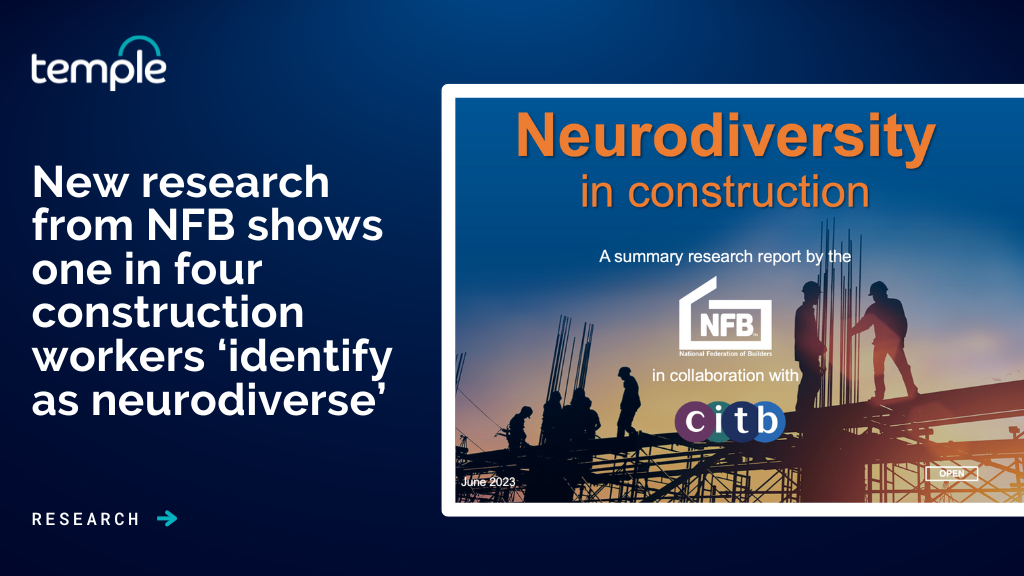
The PSTI Act, a new cyber security law in the UK, takes effect today.
The 29th of April 2024 is an important date for IoT manufacturers and anyone selling connected devices in the UK. This brand new and world-leading

A quarter of construction workers consider themselves to be neurodiverse, according to a report by the National Federation of Builders (NFB).
The figure is higher than that of the general public, among whom one in seven is estimated to have a neurodiverse condition.
Neurodiversity refers to different thinking styles that affect day-to-day functioning. Common neurodiverse conditions include autism, attention deficit hyperactivity disorder (ADHD), dyslexia, dyspraxia and dyscalculia.
ADHD was the most common condition among those who self-reported as neurodiverse, with more than half indicating that they had it. Autism and dyslexia were also relatively common, each accounting for nearly a third of the survey group (32 per cent and 31 per cent respectively).
Respondents painted a generally positive picture of the construction industry, with 67 per cent saying that they believed the sector was able to support neurodiverse workers.
Eighty per cent of those who had told their employer about their condition said they had been supported with reasonable adjustments, and 76 per cent said that their co-workers had dealt well with issues that arose due to their neurodiversity.
Over a third of neurodiverse workers said that their condition made working in construction a more attractive prospect, with only 5 per cent reporting the opposite. NFB senior vice chair Joe Cook called the finding “heartwarming”.
“We must hold this accolade dear while striving to become an even more welcoming home for people with neurodiversity,” he said.
Despite this, there is still progress to be made in supporting neurodiverse staff in the construction industry. Thirty-six per cent of the neurodiverse workers surveyed said that they had not told anyone at work about their condition, with many indicating that they were worried about how they would be perceived by others.
As Construction News has previously reported, hiring neurodiverse workers can bring significant benefits to companies. However, neurodiverse staff may have specific additional needs that are not currently catered for in the workplace, the NFB report noted.
It said dyspraxic individuals may struggle with the motor skills required to operate machinery, while people with autism may find themselves overwhelmed by a noisy workplace.
The NFB said it was important to remember that no two individuals are the same, and not to assume that one person’s experience of a neurodiverse condition will reflect someone else’s.
There are numerous measures that firms could implement to support neurodiverse staff, according to the report. Many of those surveyed suggested that neurodiverse construction workers would benefit from company-wide neurodiversity training, tailored individual support or a wider offering of communication methods.
The report also recommended that neurodiversity should be considered during the recruitment process; 75 per cent of respondents said they were not asked about neurodiversity at the hiring or onboarding stages, highlighting a missed opportunity to offer support.
NFB commercial director Danny Clarke said he hoped the report would act “as a call to action for people to better understand how we can all better support each other”.
“Only through understanding the unique skills and perspectives that neurodiverse individuals bring to the table will the industry benefit, and also improve the overall wellbeing and job satisfaction, of all workers,” he added.
Download the report here

The 29th of April 2024 is an important date for IoT manufacturers and anyone selling connected devices in the UK. This brand new and world-leading

Dave Treadwell, VSUK Quality Manager and subregion Coordinator for VSNE covering Holland and Germany, takes us through his experience of becoming a CQI Fellow and

Temple QMS is delighted to be supporting the roll out of new grant funding in the Shropshire region. We will be supporting SME manufacturing businesses

Global Compliance – Online event This presentation from Management Consultant Peter Lee, will be held 15 May 2024 – 19:00 – 19:45 CE and UKCA